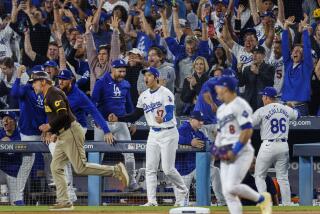Right Place, Right Time for Snyder
- Share via
“He’s a manager’s dream! He does everything you ask of him, everything you’d want! The team is lucky to have a player of his caliber!”
Whom, would you guess, is Manager Tommy Lasorda talking about? Willie Mays? Henry Aaron? Barry Bonds? Willie Stargell? Maybe Duke Snider?
He’s talking about Cory Snyder, not Duke. He’s talking about a guy who has been shopped around the league like a hot diamond, who has had trouble breaking in a lineup, who has been traded twice, given his outright release once and whose statistics will never be confused with Cobb’s or Hornsby’s and who has never played on an All-Star team.
It may be a long time before they call this Snyder “Duke.” But the Dodgers think they have found his spot in the lineup. They were gratified and relieved to have him when Darryl Strawberry went down.
It doesn’t take a Rhodes scholar to figure out what Cory Snyder needs. It’s what any artisan needs--regular work, steady regular practice at his craft.
There were some ballplayers--Manny Mota comes to mind--you could find on a desert island, marooned for several months. Rescue them, throw them a curveball and they would promptly hit it off the wall.
Most players are not like that. Hitting the curve is not that easy. Most players have to play regularly or their batting stroke gets cobwebbed, their rhythm slips--and so does their average. Cory Snyder is probably never going to challenge for the league lead. But he’s never going to challenge for anything if he’s spot-played.
Cory Snyder played on one of the storied baseball teams of all time. No, not the 1927 Yankees or the 1934 Gashouse Gang. The 1984 Olympians.
Baseball was a demonstration sport in the Los Angeles Olympics that year. And the United States fielded a team the likes of which is seldom seen in this country. It had Will Clark, Mark McGwire, Barry Larkin, Shane Mack, Bobby Witt, Oddibe McDowell, Bill Swift, B.J. Surhoff and Chris Gwynn on it--and Cory Snyder was one of the biggest stars, a “can’t-miss” prospect. He hit .400 for the team.
He had natural power. He got a full scholarship at Brigham Young, where he hit 73 home runs in three seasons and had a slugging percentage of .884.
Cory did not linger in the minor leagues. He hit 37 home runs and drove in 126 runs in 188 games and was brought up by Cleveland, where he promptly hit 24 home runs in 103 games. Then, he hit 33 home runs in his first full season.
The league thought it had a new Sultan of Swat. Eighty-three home runs in his first three big league seasons is power stuff of the highest order. The road to Cooperstown looked wide open.
If there was a fly in the ointment--well, it really wasn’t a fly in the ointment, that would have been an improvement. It was a strikeout in the ointment. It was the fact Cory whiffed 166 times the year he hit 33 home runs. But that’s not calamitous. After all, Reggie Jackson struck out 2,597 times in his career and nobody ever gave any thought to platooning him.
But the average dipped. Cory got 59 extra-base hits in 1987--and only 77 of the other kind. He hit .236, .272, then .215 and .233. The ball was in trouble when it got in his wheelhouse, but Cory was in trouble when it wasn’t. He began to get traded for household names like Steve Wapnick, Shawn Jeter and Eric King. People thought his first name was free agent.
Cory does not admit to shortening his swing in the interest of contact, but, when he wound up in San Francisco last year, he batted a respectable .269 and was a useful cog in the Giants’ attack.
The bulk of the evidence is, when Cory Snyder plays regularly, he is a dangerous character. In looks, he is a dead ringer for the golfer John Daly, and he swings a club like him, too. His impetuosity may be seen in the fact he walked only 23 times last season. But he has already walked 26 times this season. He waits on the curveball now.
“I like to think I’m a smarter hitter now,” he explains. “I’m comfortable at the plate when I play more. I’m aggressive at the plate, but not desperate. I feel like I’m there to drive in runs, and I study the pitchers’ tendencies more instead of just going up there swinging and hoping.”
He is a better-than-average fielder with one of the strongest throwing arms in the game. The home run stroke has become more sporadic--he has six this season--but Snyder insists the power is still there. “You don’t try to hit home runs--they just happen,” he tells you.
Whatever happens, the Dodgers were lucky to find him in the window with a “Make Offer, Will Travel” sign this winter. Last year, the loss of Strawberry--and, to a lesser extent, Eric Davis--was catastrophic. This year, Snyder has helped keep the team respectable.
“Anybody who doesn’t like ‘Corndog’ (the manager’s nickname for him), doesn’t like Christmas! Doesn’t like pasta!” Lasorda roars. “I wish I’d find three like him under my tree! He’ll play three positions, hit with power--and lock up after the team has gone home if you want!”
Maybe they should start calling him Duke, after all.
More to Read
Are you a true-blue fan?
Get our Dodgers Dugout newsletter for insights, news and much more.
You may occasionally receive promotional content from the Los Angeles Times.








